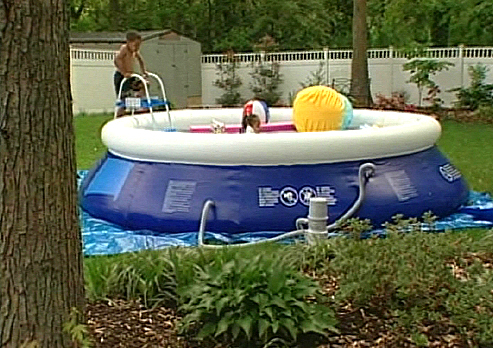The Abnormal Use Guide to Pool Safety
With summer on the horizon, the Consumer Product Safety Commission has issued a warning to users of portable pools. According to the report, an average of 35 children under the age of 5 die annually in portable pools, accounting for 11 percent of all pool drownings. Considering these statistics, the CPSC obviously has valid reasons for concern. However, in our usual irreverent way, we here at Abnormal Use must question the sufficiency of the CPSC’s tips for the prevention of such accidents.
There’s nothing necessarily wrong with the CPSC’s tips. Rather, the advice is more akin to a helpful reminder that breathing is essential to sustain life. Take this tip for example:
Teach children to swim, float and other-life saving basics. But do NOT consider young children “drown-proof” because they have had swimming lessons.
No doubt, the ability to swim is a great way to lessen one’s chances of drowning. We understand that not all parents are ideal, but do people really consider children taking swim lessons as “drown-proof”? After all, they are called swimming lessons – not Olympic training. Maybe the better tip would be:
Even children capable of swimming are susceptible to drowning. When children are playing in pools, always assume that accidents are possible.
Our personal favorite tip is one with a great deal of merit. It is perfectly logical. Yet, something about it seems a bit misplaced.
If you can’t fence the pool, use smaller, easier to store portable pools. Then, empty the water ANY time you are not supervising the pool and turn it upside down or store it away.
Again, it’s good advice. If a small pool is capable of being drained after each use, it makes sense to do so and take away the hazard. But is this really the solution? Reading between the lines, we know what the CPSC really meant to say:
If you choose to purchase an unsightly above-ground pool, fence it in. If fencing is not an option, save yourself the embarrassment of having others know you purchased an above-ground pool by seeking other options. Small plastic pools are socially acceptable for young children. There is no shame in having your children observed temporarily playing in such pools. But please, empty the water and remove the pools from your yard when not in use. Teach children to clean up their toys.
Even if fencing is an option, understanding why anyone elects to purchase a large, above-ground pool is beyond our pay-grade. If the CPSC was forthright, they would have taken inspiration from the late Mitch Hedberg:
Do not be persuaded through television advertising to purchase an above-ground pool. Those commercials are only 30-seconds long because that is the maximum amount of time you can depict yourself having fun in an above-ground pool. To prevent accidents and overall boredom, please seek out safer, more entertaining alternatives.
With that said, we do applaud the CPSC’s efforts. Pools do present a risk of drowning. With an appropriate level of care, many of these accidents can be prevented. If you do have a pool in your yard – of any type – we refer you to the most important rule formulated by the Commission:
NEVER leave a child unsupervised near any pool or spa.
















Pingback: Las Vegas Accident Attorneys - Blog | Las Vegas Accident Attorneys / David Francis Law Firm